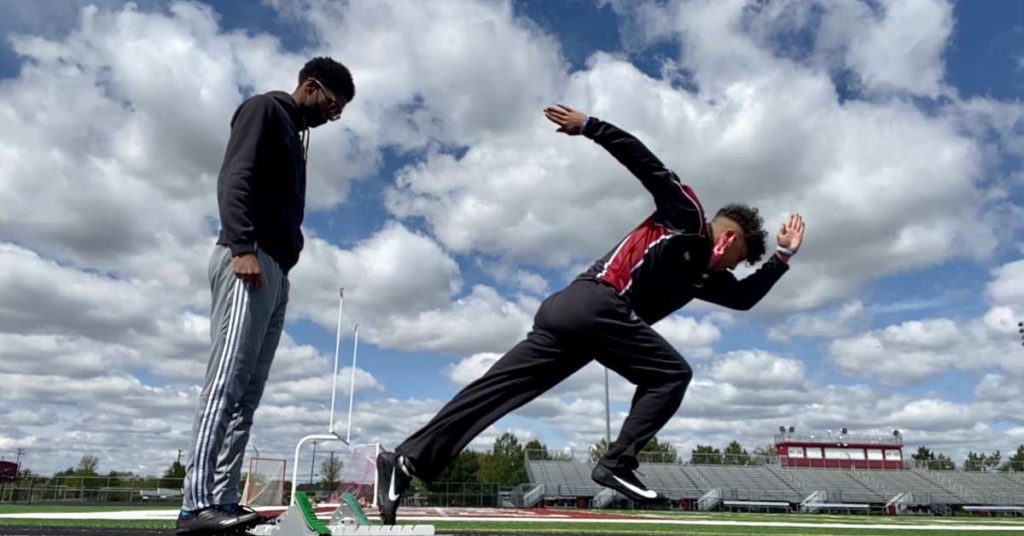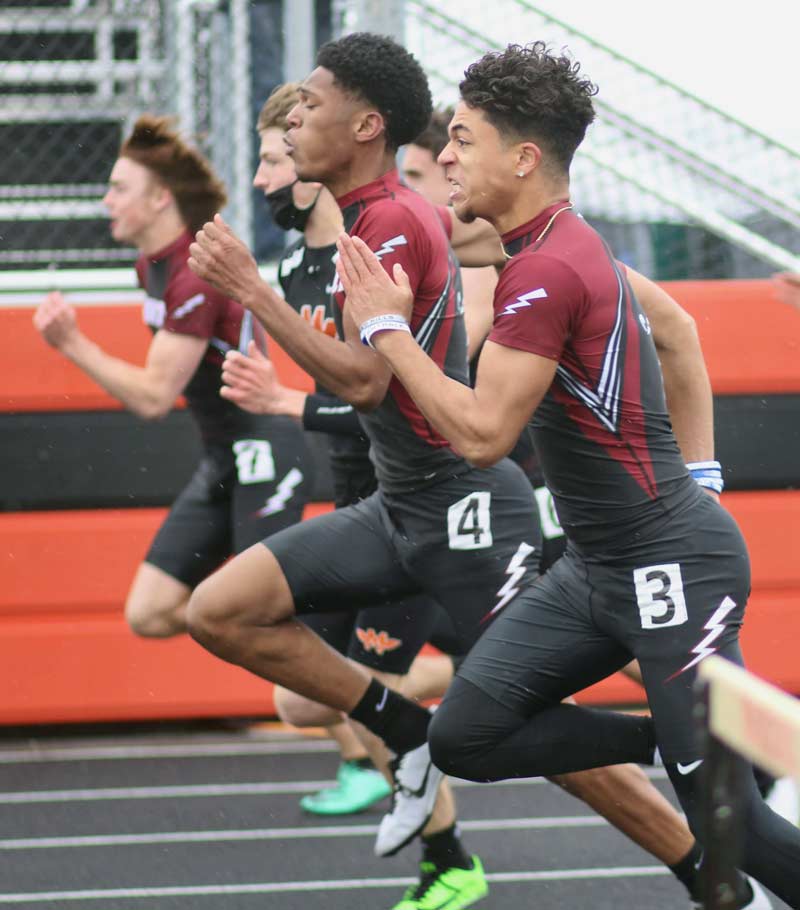
I recently traveled to Scottsdale, Arizona, to lead a weekend of speed training with a variety of athletes, most of them lacrosse players. I planted seeds with those kids, encouraging them to spend their time away from their sport building athleticism. I explained that athleticism has nothing to do with the skills of a particular sport: it’s power, speed, and explosiveness. Athleticism is—in the words of Mike Whiteman—”the ability to lift heavy, sprint fast, jump high, and jump far, transforming athletes into apex predators.”
While coaching in 100-degree weather there in the desert, several guys on my track team back in Illinois practiced on a beautiful 40-something degree day. Others had the day off. Four were set to run Saturday night at the Palatine Distance Night. Around noon on Saturday, I got a text from one of those athletes with the off-day, Mason Eskridge. Mason had shown up at the track, on his own, to work on block starts with his teammate Lavell Patterson. Mason and Lavell are seniors—my two fastest sprinters.
Accompanying the photo above, Mason’s text simply read: “Me and Lavell working while you’re out of town” (followed by three emojis: cat, lightning bolt, lightning bolt).
“So proud of you guys!” I replied. And I couldn’t stop thinking about the text and this beautiful picture.
As coaches, teachers, and parents, we work and work and work. We make the rules; we enforce the rules. We provide motivation. We give and give and give and feel good about our sacrifices. We help kids to set goals and then drive them to accomplish those goals. Then, however, we tend to complain that kids are not self-motivated or self-driven and lack maturity.
Sometimes the best thing you can do for your athletes or your own kids is to step back and let them build their own house. Sometimes it is important to find ways to not be so indispensable, says @pntrack. Share on XSometimes, the best thing you can do for your athletes or your own kids is to step back and let them build their own house. Sometimes it is important to find ways to not be so indispensable. Maybe our goal as coaches, teachers, and parents is to teach ourselves out of a job.
Flashback: April 19, 2021
After missing the 2020 season, our first meet of 2021 was cold, wet, and miserable. Our football players were in their final week of the season and didn’t attend this meet at Minooka High School. We only took 14 sprinters—11 of our 14 cats were running in their FIRST-EVER track meet. Our relay teams showed up without batons. Some guys reported to their race forgetting their spikes. In the fast heat of the 100m, the gun went off six times before my guys figured out that the race had been recalled. One guy ran with his uniform on backward.
When my son, Alec, heard about this comedy of errors, he suggested I might have to leave my camera at home and coach a little more this year.
Alec always makes me think. I love photographing track meets—I can make meets look better (much better) than they really are, and great pictures are central to the promotion of my track program.

Aside from documenting the meets and promoting the program, there’s another reason I take pictures—I want to send the message to my athletes that they are responsible for themselves. I coach and prepare them during the week. I’m there to help at meets—but I’m not responsible for their batons, their blocks, their spikes, or putting their uniform on correctly. They are responsible for warming up, achieving one perfect handoff, picking up their hip numbers, and reporting to their race at the right time. And, of course, they are ultimately responsible for their own performance.
I want them to learn to build their own house. Me playing photographer speaks loud and clear to them: You own it.
A Few Sentences on Balancing Parenthood and Coaching
One weekday, we had a meet at Oswego High School, and our assistant coach, Andy Derks, told me he would be late to the meet. His daughter, Maddie, had her first middle school cross country meet the same day, and he wasn’t going to miss it. Not only did this send a fantastic message to Maddie about her father’s priorities, this also spoke volumes to our distance crew. You see, Andy Derks has done the work to make his athletes less needy and more self-sufficient—not only could Andy step away from his D-Crew for the first hour of a meet, he could step away for a month.
His athletes have learned to build their own house.
My Parenting
As I mentioned previously, coaching is synonymous with teaching and almost synonymous with parenting. (You can choose your team; you can’t choose your kids. And, your athletes graduate…but your kids are yours forever!)
Teaching, coaching two to three sports, and raising four kids will make you prioritize as a parent. (I wrote about survival tips for parenting and coaching a few years ago here.) While it sends an important message to your kids when you make a point of seeing them compete as Andy did, attending EVERY activity is impossible. Attempting to attend every activity would ruin your life (and may not be so good for your kid, either).
You see, as important as it is to be there for your kid, it’s equally as important to not be there.
You see, as important as it is to be there for your kid, it’s equally as important to not be there, says @pntrack. Share on XTwo stories come to mind:
- Back in 2004, my son Troy was one of the top-ranked seventh-grade hurdlers in the Harrisburg (IL) area. I had my own track meet and could not attend his Regional meet on May 6. Troy hit a hurdle, fell, and broke his arm. My wife, Jill, was there and took care of business. The next year, on May 6, I attended Troy’s eighth-grade Regional meet. Troy was favored to win the race but hit a hurdle, fell, and broke his arm. Again. Same day, same race, same arm. I literally got sick to my stomach. This time, I took care of business. (And, two years later, bribed with a pug puppy, Troy resumed hurdling).
- As a junior at Harrisburg, my son Alec was a great basketball player. I think I saw all his games. At Christmas, he was averaging 25 points and 10 rebounds before quitting the team due to bizarre circumstances beyond his control.
- The next season, playing at Franklin, Alec entered the basketball season with a football injury (a snapped tendon in his finger). Before his first game, he dislocated his shoulder. With everyone returning, Franklin went out to a 20-0 start and was ranked No. 1 in Tennessee. During the first half of the season, Alec came off the bench and never looked like his old self. It was hard for me to watch, and eventually my wife and I decided that it might be best for us to miss a few games.
- On a Friday night, Franklin played at their rival, Brentwood. Alec hadn’t scored in the previous game, and my wife and I didn’t make the trip to Brentwood. The game happened to be televised in the Nashville area, and Franklin’s starting center sprained his ankle early in the game. Alec replaced him and, within seconds, stole a ball and turned it into a thunderous dunk at the other end. I think I jumped as high as the ceiling in our small living room. Alec went on to play like his old self for the rest of the season, arguably the team’s best player through that stretch.
I missed Troy’s first broken arm in 2004 and Alec’s incredible dunk in 2005. Would my attendance at either of those events have altered the outcome? Do Troy and Alec look back at those events wishing I would have been there?
I think not.
My Own Racing Days
My parents had four kids, and my father coached multiple sports.
As a seventh grader, I was a tall kid but the slowest guy on my track team. In my first meet, I was listed as seventh out of seven to run the 440. More than 20 kids were thrown into the race on a cinder track in Streator, Illinois. I ran as fast as I could. I remember some of my teammates laughing at me out in the lead. The last segment of the race hurt like hell, but I came in fourth, running 67.1 (the second best on our team).
My parents were not at the meet, and I’ll never forget telling my dad what had happened. I told him the whole story though the car window before getting in. Their absence didn’t detract from the feeling of that race—in fact, doing it on my own, sharing it in my own words…I think that enhanced the experience.
Total Absence
My dad, Don, was born in a tent. One of five children; raised by working-poor parents. He lived in government housing, and to say that sports became the focus of his life is like saying that fish become fond of water.
Encouragement came by way of a Hall of Fame coach Gay Kintner of Stephen Decatur High School. In 1951, Kintner gave my dad a basketball and told him, “Holler, wear this thing out. You are going to be one of my great ones.”
My dad went on to play college basketball and baseball at Millikin University. How many games did Don Holler’s dad attend? Zero. Not one, not at any level. Zero. (My grandmother attended just one high school game, and as luck would have it, my dad got sick before the game and didn’t play.)
Not only did my grandfather not attend any of my dad’s games, he actively campaigned for my dad to quit sports and get a job, going so far as to hide my dad’s ball glove one time on the day of a game.
Even in the absence of any encouragement from his parents, my father still loved sports.
The inflection point for my father came from his high school basketball coach, who gave him a basketball, encouraged him to play, and told him he could be great. Gay Kintner told my dad to build his own house. And he did: Don Holler is now in three Halls of Fame (Millikin University, Aurora University, and the Illinois Basketball Coaches Association).
After his playing days were done, he spent the next 47 years being Gay Kintner to hundreds of athletes.
Be There, but Also Don’t Be There
Coaches, teachers, and parents have a strange job. We must be there for our kids. We must give them guidance and instruction. We must encourage the good, discourage the bad, and set an example.
Then we must step away and let them learn to fly.
If we’re doing it right, even when we’re 1,500 miles away in the desert or just at a different event closer to home, we will still always be there—even when we are not.
Since you’re here…
…we have a small favor to ask. More people are reading SimpliFaster than ever, and each week we bring you compelling content from coaches, sport scientists, and physiotherapists who are devoted to building better athletes. Please take a moment to share the articles on social media, engage the authors with questions and comments below, and link to articles when appropriate if you have a blog or participate on forums of related topics. — SF


Awesome stuff! Thank you.
Love it!